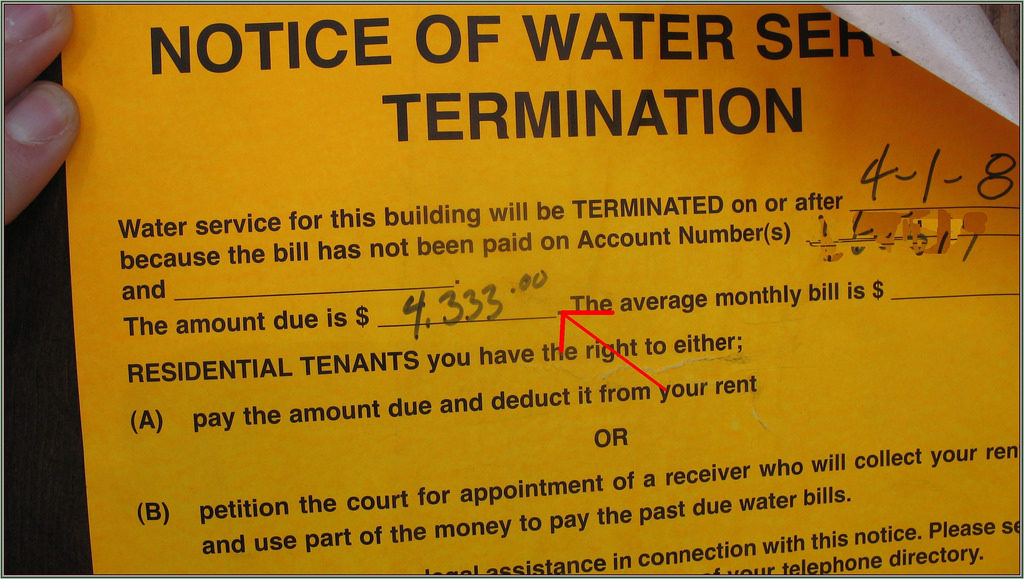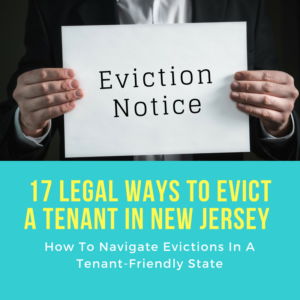Do you find NJ eviction laws confusing? Do you live in a Tenant-Friendly State like I do?
In my nearly 10 years as a landlord, I’ve never had to deal with an eviction (yet!). I wanted to learn about the process BEFORE I need to evict a tenant. So I decided to do a little research to understand the process. It turns out there are some quirky laws in my state that I believe every New Jersey landlord needs to know.
Even if you are not a New Jersey landlord, I think you will find useful tips below that can help you avoid issues when you are evicting a tenant in your own state.
In Part One of this two-part series, I will tell you what you need to know about each of these quirky NJ eviction laws and how to avoid getting in trouble.
In Part Two of the series, I will review the NJ eviction process in more depth, including the only valid reasons you can evict a tenant in New Jersey.
3 Quirky New Jersey Eviction Laws You Should Know
1 – You Can’t Simply Evict A Holdover Tenant

Of course you can kick someone out after his or her lease has ended right? Wrong! It’s not that easy in New Jersey. This one will surprise non-NJ landlords the most.
“No landlord may evict or fail to renew any lease of any premises covered by…this act except for good cause….” N.J.S.A. 2A:18-61.2
According to the NJ anti-eviction act, you cannot evict a tenant simply because they have overstayed their lease. This isn’t considered a valid reason to evict in NJ.
Such “Holdover Tenants” can be managed out via the eviction process in most states, but it is more complicated in NJ.
If your NJ tenant fails to leave after the expired lease, the landlord’s best option is to raise the rent a reasonable amount or otherwise change the lease terms. If the tenant refuses to pay the new rent or accept the new terms, then you can begin the eviction process.
Steps To Raising Rent On A NJ Holdover Tenant
- Send a Notice to Quit – tell the holdover tenant that they need to return possession of the property by a specific date.
- Send a Notice of Rent Increase and/or Lease Change – Inform the holdover tenant of any changes to your lease terms including what the new rent will be and when it goes into effect.
If the holdover tenant fails to pay the new rent, a NJ landlord now has a valid reason to begin eviction proceedings (Failure To Pay Increased Rent). See Part Two of this series for 17 Valid Reasons to Evict a NJ Tenant.
Note that the changes to the lease must be “reasonable” according to a judge. The judge will consider such things as:
- The amount of the rent increase
- The market rate in the area
- How profitable the property is
- How “shocking” the changes are
When Can A NJ Landlord Legally Charge Double Rent?

There are two special provisions under NJ Landlord-Tenant law (N.J.S.A. 2A:42-5 and 2A:42-6) which allow a NJ landlord to charge Double Rent to a Holdover Tenant.
2A:42-5. Holding over by tenant after giving notice of quitting; double rent recoverable
If a tenant gives notice of their intention to quit the property and fails to deliver possession, the landlord is entitled to double the stated rent every day until the tenant leaves the property.
2A:42-6. Willful holding over by tenant after expiration of term; notice to deliver possession; penalty
When a tenant willfully stays in the property after receiving written notice to deliver possession after the end of the lease term, the landlord is entitled to double the rent.
These provisions can be modified by agreement. A NJ court even allowed 3x Rent!
Your ability to collect double rent depends on what your lease states. If your lease specifically states a Periodic Tenancy or Tenancy At Will exists at the end of the lease, then this provision doesn’t apply.
Know exactly what your lease states when it comes to holdover tenants!
2 – Some Landlords Are Required To Get A Lawyer Under NJ Eviction Laws

Only Sole Proprietors and Partnerships may represent themselves in eviction proceedings according to the NJ Judiciary.
This means if your property is owned by an LLC, Corporation, Trust or some entity other than you or a partnership, then you must pay a lawyer to represent you in court. In fact, I’ve read that even lawyers cannot represent themselves. You must pay another attorney to represent them!
This rule is even more relevant after the Tax Reform passed in 2017 as more and more landlords create Pass Through Entities to take advantage of the new 20% deduction on rental income.
PRO TIP – Hire A Lawyer For Your First Eviction
I recommend consulting a lawyer if this is your first eviction (Landlord Tip #50 – Build Your Team). Most of us Accidental Landlords prefer to DIY many things but this is not one area you can (or should) save money.
Evictions usually drag out because a landlord made a technical mistake along the way that created a defense for the tenant. Learn the process so you have a basic understanding, but also invest in a lawyer to handle your first eviction. Ask them questions so you have a better understanding for the future.
You can connect with an experienced New Jersey eviction lawyer for a free, no obligation consultation by filling out this form
3 – Tenants Can Pay Your Utility Bill In Lieu Of Rent

It’s true. If you include utilities in your rent and you fail to pay the utility bill, your tenant can pay the bill on your behalf. That will be considered part of their rent payment. You cannot evict them for failure to pay rent if they withhold the portion of the rent they used to pay your utility bill.
What the NJ eviction law says
According to New Jersey Stat. Ann. § 2A: 18-61.1(a)
“any portion of rent unpaid by a tenant to a landlord but utilized by the tenant to continue utility service to the rental premises after receiving notice from an electric, gas, water or sewer public utility that such service was in danger of discontinuance based on non payment by the landlord, shall not be deemed to be unpaid rent.”
A couple of key points to note from the law:
- This applies to public utilities only. Failure to pay the cable or Internet bill doesn’t apply.
- Tenant must receive notice from the public utility that their service is in danger of being shut off.
- The landlord must have failed to pay the bill.
This law could put you in a tough situation.
Imagine you have a tenant that has run up a significant utility bill. While you dispute who owes the bill, the tenant receives notice the utility will be shut off. Your tenant then pays the utility bill but withholds the same amount from the rent. You could be out the amount of the utility bill despite what your lease says.
PRO TIP – Keep All Possible Utilities In The Tenant’s Name
This quirk in NJ eviction laws is another great reason why I recommend landlords keep the utilities in their tenants name whenever possible.
In addition to avoiding a situation as described above, they will also avoid the hassle of splitting bills, non-payment and arguments about who is using more water in the building. Do yourself a favor.
Avoid paying for utilities wherever possible!
Further Resources
Evictions are complicated in every state, especially in a Tenant-Friendly state like NJ. Here are a few resources that can help you understand the process or avoid an eviction in the first place.
New Jersey Specific
- New Jersey Landlord Tenant Laws – Landlordology
- NJ Eviction Laws
- NJ Holdover Tenant Law
- Tenant Defenses To Evictions In NJ – NOLO
- New Jersey Eviction Notice Kit – Landlord Guidance
General Eviction Process
- How Evictions Work – NOLO
- Eviction Process – A Step by Step Guide – Landlordology
- How To Evict A Tenant – Bigger Pockets
Further Reading & Resources
My book, The Accidental Rental, has a chapter dedicated to handling evictions the right way, including legal forms. The Accidental Rental will show you how to get rid of your bad tenant step-by-step! Click on the link or image above to learn more.
Find NJ Eviction Lawyers
Looking for an experienced NJ eviction attorney who can help you win your case? Fill out this simple form to have a local attorney review your information. It’s free and there is no obligation. If they think they can help you, they will reach out to you directly.
Ask A Lawyer Online Now
Need a quick answer from a legal expert but don’t want to retain an attorney?
Try Rocket Lawyer’s Ask-A-Lawyer service (affiliate partner). Their on-call network of lawyers can answer your question fast without the high fees.
Conclusion
It’s no mystery that real estate laws, and eviction laws in particular, can be very tricky to navigate. This is especially true for New Jersey eviction laws under the Anti-Eviction Act
Every New Jersey landlord needs to understand the quirky parts of the NJ eviction laws to make sure they know their rights when dealing with an eviction.
- Know what to do when a tenant overstays their welcome, including how to legally evict them.
- You must hire a lawyer to represent you in court if you own your rental property in a pass-through entity other than a Partnership or Sole Proprietorship.
- Put utilities in your tenant’s name wherever possible to avoid possible nonpayment of rent issues with your tenant.
If this is your first eviction, I highly recommend consulting a local professional to make sure you understand the process and the necessary notices involved. Evictions are often delayed and thrown out because of minor technicalities.
Next month’s article will go into much more detail about the only valid reasons you can evict a tenant in New Jersey. Stay tuned!
Tell Me About Your Eviction Experiences
What are some surprising eviction laws in your state? Do you represent yourself in court? How scary was your first eviction? What tips do you have for your fellow landlords?
Please leave a comment below.
Want More Landlord Tips?
Sign up today for the Accidental Rental newsletter for access to more free money saving tips and tricks including my latest free bonus gift!






I am interested in your newsletters. Please add me to your newsletters list.
I am a disabled individual living in a private house. My lease is up september 1. The new landlord wants to renovate the house. I cannot find housing in a senior facility. what can I do to avoid being evicted and get additional time to find a facility
Sorry about your situation. I am not a lawyer. Are you in NJ? You can get legal assistance from LSNJ if you qualify. In NJ, you can apply for a hardship stay which will delay an eviction for 6 months. This could be enough time to find a new place to live. You have to keep paying rent in the meantime though.
Hello,
I read in a similar posting that landlords can only deduct from the security deposit unpaid rent and/or repairs. Do you know if there is a state law that provides for this? Thanks!
The relevant law is N.J.S.A. 46:8-19 THROUGH 26
Deductions are typically limited to unpaid rent and damage beyond normal wear and tear but the act doesn’t apply to all landlords and the law is a little vague. This passage from the law actually makes it seem like any charges incurred pursuant to the lease could be deducted.
“less any charges expended in accordance with the terms of a contract, lease, or agreement,…”
If you are a landlord, be careful making deductions beyond unpaid rent and excessive damage. The penalty for wrongful withholding is 2X the amount wrongfully withheld plus legal costs.
Always seek expert legal advice. I’m not a lawyer.
I informed my tenant 9 months ago that I want to sell my property and that I will not renew the lease agreement when it expires. I explained to the tenant that property is currently 5 units. The tenant occupies the 5th unit. I will be changing the use of the property to 4 units in the upcoming sale. I need the tenant in the 5th unit to move to another unit or move altogether. I offered the tenant another larger available unit at the same rent until the tenant’s current lease expires. This was an option provided at the time because there was one vacancy. The tenant did not accept that offer. The tenant informed me that they were looking for alternative housing and then covid19 came into play, this slowed the process understandably. The tenant was then given more options to assist the move. A monetarily incentive was offered along with the return of the security deposit to assist with the move. For months, the tenant did not take advantage of the offers. The tenant recently reached out to me telling me that they want to vacate in two days requesting the security deposit before vacating. I want the tenant to move out. How can best can I protect myself if I give the tenant the funds and they do not move? I required from the tenant a signed notice to vacate as of today and the keys to the apartment. The tenant claims they need the money the day prior to the apartment being vacated in order to cover security deposit to the new landlord and moving expenses. I offered to return the security deposit via check today if I get the letter to vacate dated for today and the keys to the apartment today. The tenant them claims they will move all personal items the next day. I told the tenant that they can not occupy the apartment overnight and all items must be removed the next day. Domenick I know you’re not a lawyer, but do you have any recommendations?
Your instincts are right. You have been very flexible but they are not working with you. Do not give this person back their SD until they have moved out their belongings. All you can do is emphasize that they will get their full deposit (despite any damage) immediately after they vacate and move all of their belongings. Write out the check and show them. They are using you as a bank and a storage facility and there is no guarantee they will leave once they get their money. Is there an outstanding rent due? If so, then you can offer to waive that to help cover their moving costs as well. I’m not a fan of cash for keys but that’s a personal decision.
Whatever you agree to, make sure you get a signed mutual lease termination agreement in writing. Keep in mind that your tenant doesn’t have to agree to move and you can’t evict them because you want to sell. You must already have a contract to sell with a clause that says you are selling it unoccupied. You are in a tricky situation so it’s important to get their agreement in writing. Sorry I can’t be of more help. Good luck!